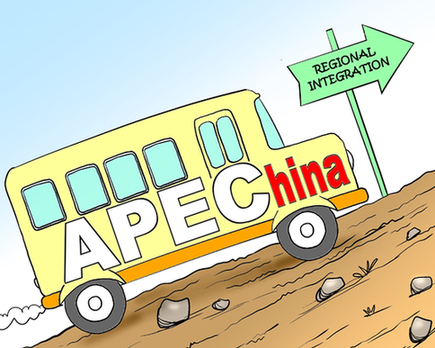A crucial juncture: Prospects for the Beijing APEC summit
- By Tim Collard
 0 Comment(s)
0 Comment(s) Print
Print E-mail China.org.cn, November 8, 2014
E-mail China.org.cn, November 8, 2014
Preparations are now in full swing for the opening of the Asia-Pacific Economic Cooperation Summit in Beijing. Amid the plethora of multilateral forums thrown up by our rapidly developing, highly-networked, multipolar world, APEC is one of the oldest (first established in 1989, China acceded in 1991) and most influential. APEC's special significance is that, unlike many of the more recently created regional forums, it enables the United States to engage China and the other major Asian economies on an equal basis.
|
|
|
China is ready [By Jiao Haiyang/China.org.cn] |
China's approach to APEC involves ensuring strong and stable regional economic structures in which China's own rapid economic development can best flourish. As Foreign Minister Wang Yi expressed in his pre-summit communiqué, "[China has] taken ever greater initiatives in creating a favourable external environment for realizing the Chinese dream of the great renewal of the Chinese nation." This has not always been an easy process. The very speed and strength of China's recent economic development requires a constant reinforcement of these structures in order to avoid the emergence of imbalances resulting from China's newly augmented power.
The other essential quality of APEC is that it is avowedly an economic rather than a politically-oriented organization. APEC membership consists not of member states but of "member economies," because - according to an official report - "the APEC cooperative process is predominantly concerned with trade and economic issues, with members engaging with one another as economic entities." This also means, of course, that Hong Kong and Taiwan can participate as separate entities without the interference of questions of sovereignty.
Wang Yi's communiqué also underlined China's intent to momentarily lay territorial disputes aside for the purpose of the APEC discussions. "China stands ready," he said, "to properly handle maritime and territorial disputes left over from history through peaceful consultations, respecting historical facts, and in accordance with international law and norms governing international relations." This will be vital to the creation of an atmosphere in which the practical requirements of increased economic cooperation can be objectively considered, which is especially important to issues where China, Japan and the U.S. are jointly concerned. Though the plenary sessions will deal with the framework for economic cooperation, there will of course be opportunities for meetings in the margins where tougher questions can be discussed bilaterally.







Go to Forum >>0 Comment(s)